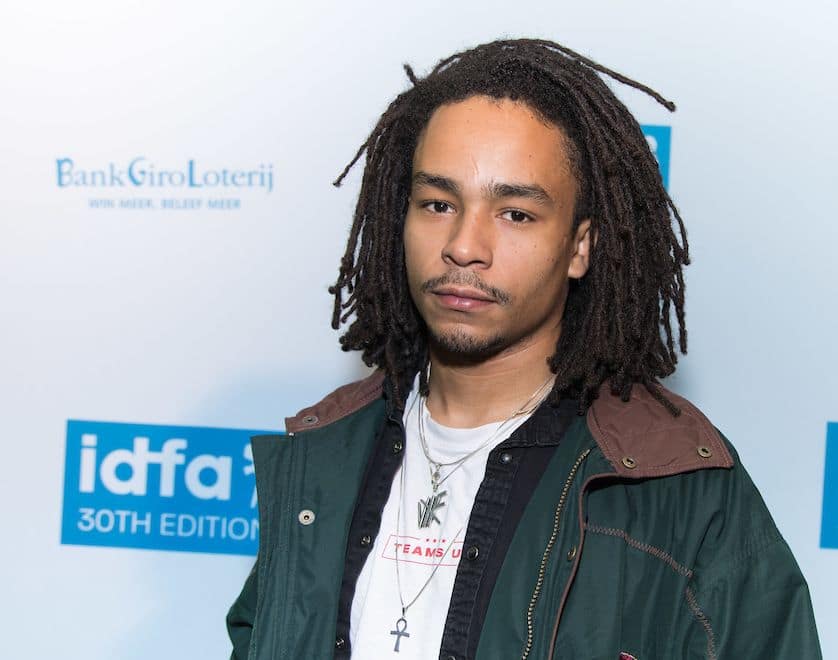Toon ambitie, kom uit de hokjes, maak uitdagend werk, verbreed de blik! Met enige regelmaat horen we dergelijke aansporingen aan het adres van de Nederlandse film. Is er al beweging? Gouden Kalf-winnaar Buladó is inmiddels onze Oscar-inzending. Dat zal voorstanders van meer kleur in de Nederlandse film tevreden stemmen. En kijk zondag eens naar When You Hear the Divine Call van Festus Toll, een wat bescheidener maar even sprekend voorbeeld van nieuw licht in de Nederlandse film.
In deze korte, maar rijke documentaire impressie gaat de maker op zoek naar zijn Keniaanse achtergrond. Helemaal op zijn eigen manier, waarbij gevoel en experiment voorrang krijgen. Want, zo lijkt hij te willen zeggen, informatieve documentaires zijn er al genoeg. Op het Nederlands Filmfestival sprong When You Hear the Divine Call er genoeg uit om genomineerd te worden voor de Prijs van de stad Utrecht. De jury noemde het een bevrijdend ego-document.
Bicultureel

Festus Toll is een kind van twee culturen. Letterlijk ook, want zijn moeder komt uit Kenia, zijn vader is Nederlands. Als filmmaker studeerde hij in 2017 af op AKV|St.Joost met We Will Maintain, bekroond met de TENT Academy Award. Een documentaire waarin hij de biculturele identiteit verkent en het cliché dat de multiculturele samenleving mislukt zou zijn aan de kaak stelt. When You Hear the Divine Call is een vervolg daarop.
“In mijn afstudeerfilm kijk ik naar de Nederlandse samenleving”, licht hij toe in een telefoongesprek. “In When You Hear the Divine Call grijp ik mijn kans om op verkenning te gaan in Kenia.”
In de film volgt hij zijn oom Mike. Deze liet in 1990 Kenia achter zich, op zoek naar groener gras, zoals hij zegt. Nu heeft Mike serieuze plannen voor een permanente terugkeer naar Kenia. Daartegenover, in Nederland, Festus Tolls nog piepjonge neefje Genson. Diens geboorte vormde het startschot voor de film. De maker zelf is de derde hoofdpersoon – door ons te laten kijken met zijn blik.
Sleutelmoment
Tussen de herinneringen en mijmeringen van zijn oom en de doopdienst voor Genson, in een vrije montage van oude home-movies en poëtische impressies van Festus zelf, fungeert één beeld als sleutelmoment. We zien Festus als jongen van twaalf, die in de tuin van zijn tante beleefd luistert naar de filosofische woorden van oom Mike. Die houdt hem voor dat hij een thuisloos kind is. ‘Je hoort niet bij Afrika en niet bij Europa.’ Maar hij merkt ook op: ‘Dus je hebt zowel Europa als Afrika nodig.’
Dat is de positieve kant, zoals Festus stelt. “Je hebt allebei nodig om te ontdekken wie je bent. Het is een geluk dat ik ook allebei van mijn ouders heb meegekregen. Ik draag de film nu op aan Genson. Over twintig jaar zal die zoektocht voor hem nog steeds relevant zijn.”
Wat betekent het begrip ’thuis’ nu voor Festus?
“Thuis is een gevoel, een verlangen naar waar je wilt aankomen. Daarom is mijn tweede film ook poëtischer. Ik projecteer het op mijn oom, die na dertig jaar in Europa nu ook bicultureel is.”
Vrije beelden
In When You Hear the Divine Call kan een Nederlandse doopdienst pal naast een begrafenis in Kenia staan. Een 80-jarige danst in Nairobi onder dezelfde sterrenhemel als waar het kind in Nederland naar opkijkt. Veel vrijere beelden en associaties dan in een traditionele documentaire die alles netjes op een rij zet.
“Voor mij is het maken van een film vooral een manier om een gevoel over te brengen. Een trip door een voor de kijker nog onbekende wereld. Het verhaal versmelt met het beleven, dat zou ik in documentaires graag meer willen zien.”
“Mijn ouders hadden mij al vaker meegenomen naar Kenia, maar nieuw was nu dat ik voor de eerste keer mijn indrukken ook echt kon registreren. Ik heb het ook voor mijzelf tastbaar gemaakt als een echt deel van mijn leven dat ik kan delen met mijn oom en mijn neefje.”
“Mijn oom is nog niet definitief vanuit Oostenrijk teruggekeerd naar Kenia. Het stond gepland voor maart, maar met de pandemie is alles onzeker geworden. Zijn zoektocht moet het onderwerp worden van mijn derde film die ik heb ontwikkeld in het kader van de IDFA-academy. Donderdag lever ik het plan in.”
Dat kan dan de afronding worden van een opvallende trilogie. Opvallend, want een onderwerp waarover doorgaans in politieke termen wordt gedacht krijgt door een persoonlijke, poëtische benadering een nieuwe en universeel aansprekende dimensie.
